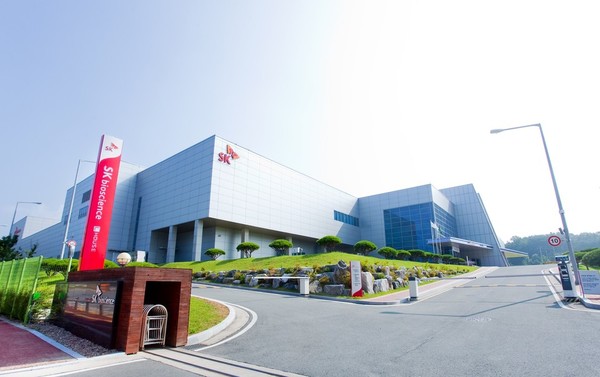SK Bioscience on Thursday unveiled the new "SKBS 3.0" growth strategy, prioritizing the expansion of cell and gene therapy (CGT) and boosting sales of existing vaccines.

In a public filing, the company unveiled its funding plan to invest about 2.4 trillion won ($1.7 billion) over the next five years until 2027.
The company plans to use the capital in four areas -- glocalization, Skybox (in-house vaccine project), contract development and manufacturing organization (CDMO), and premium vaccines.
For glocalization, the company will secure global production bases and various revenue models that meet the needs of each country, it said.
For its Skybox project, the company aims to double its sales from 110 billion won this year to 220 billion won by 2024.
To reach its goal, the company will resume production of SkyCellflu, its flu vaccine, which the company had suspended for the past two years to focus on SKYCovione, its Coivd-19 vaccine production.
Before the company halted production of SkyCellflu, the vaccine held the top spot in the flu vaccine market with a 29 percent local market share in 2020.
The company also aims to expand sales for its chickenpox vaccine, SkyVaricella, shingles vaccine, SkyZoster, and typhoid vaccine, SkyTyphoid.
Notably, SkyTyphoid, which was co-developed with the International Vaccine Institute (IVI), is expected to enter the global market after obtaining World Health Organization (WHO) 's Prequalification (PQ) certification by the end of this year.
The company will also expand its CDMO business, which has been sluggish.
The company stressed that it will actively pursue vaccine CDMO sales to multinational pharmaceutical companies, while also promoting a new bio CDMO centered on CGT.
The company expects that the CGT CDMO facility at the Songdo R&D Center in Incheon, which is scheduled for completion in 2025, will be a key driver of new growth.
The company is also reportedly considering mergers and acquisitions (M&A) of other CGT-related companies to secure faster technology and production capacity.
The company also revealed detailed revenue targets for its premium vaccine portfolio.
SK Bioscience said it would finalize plans for its phase 3 clinical trial of its pneumococcal vaccine SKYPAC by the end of the year.
In addition, the company plans to launch human papillomavirus (HPV) 10-valent vaccine and a recombinant shingles vaccine in 2027, with the company expecting to generate sales of 2.5 trillion won and 600 billion won, respectively, over the next three years after its launch.
SK Bioscience's big investment plans come amid a significant drop in the company's business performance last year.
The recorded sales and operating profit of 456.7 billion won and 115 billion won last year, down 50.8 and 75.5 percent, respectively, compared to 2021.
SK Bioscience's revenue and operating profit surged in 2021 after it started manufacturing Novavax's vaccine.
Revenue more than quadrupled in a year from 226.6 billion won in 2020 to 929 billion won, and operating profit increased more than 12 times from 37.7 billion in 2020 to 474.2 billion won in 2021.
However, due to the decline in global Covid-19 vaccination rates, the company started to face hardship in the second half of 2022 as countries around the world switched to a live-with-Covid policy and eased quarantine rules which resulted in weaker demand for Covid-19 vaccines.
As a result, SK Bioscience's CMO deals were either canceled, postponed, or minimized, which negatively impacted the company's earnings.
Related articles
- Will SK Bioscience maintain No. 1 shingles vaccine seller position in 2023?
- [Top K-Pharma Analysis ④] SK Bioscience faces trouble as sales, operating profit fall drastically in 2022
- SK Bioscience's operating profit falls 76% in 2022
- SK Bioscience to manufacture MSD's Zaire ebolavirus vaccine candidate
- SK Bioscience's Covid-19 vacine scores first international approval in UK
- KRX may label SK Bioscience as 'unfaithful disclosure corporation'
- JW Shinyak to resume marketing of SK bioscience’s flu vaccine
- SK bioscience withdraws conditional marketing authorization for Covid-19 vaccine in EU

